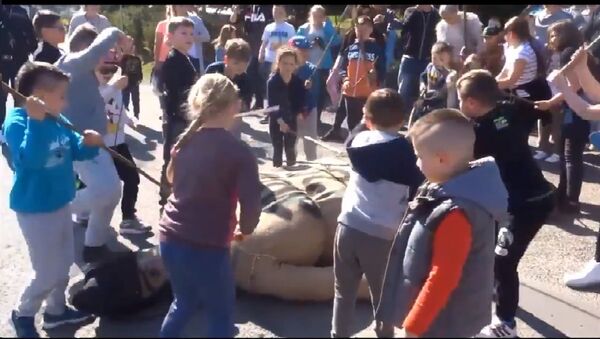The controversial observance took place in the southeastern town of Pruchnik on Good Friday. The town's inhabitants, including children, hanged the effigy resembling a stereotypical Jew that was meant to represent Christ's treacherous disciple Judas. Following the hanging, the residents beat the effigy 30 times and decapitated it before setting it on fire.
אנטישמיות בפולין: אנשי העיירה פרוכניק, בדרום פולין, הכו ושרפו בערב ליל הסדר בובה בעלת מאפיינים יהודיים סטראוטיפיים, אשר אמורה לייצג את יהודה איש קריות. זאת על רקע ציון יום צליבתו של ישו בעולם הנוצרי@antonia_yamin (צילום: J-nerations) pic.twitter.com/AvLakmmvh6
— כאן חדשות (@kann_news) 21 апреля 2019 г.
The World Jewish Congress has voiced strong contempt over the reported Easter ritual. The head of the New-York based group, Robert Singer, stated that "Jews are deeply disturbed by this ghastly revival of medieval anti-Semitism that led to unimaginable violence and suffering".
READ MORE: Uproar as Weekly With Tips on 'How to Recognise a Jew' Sold in Polish Parliament
Twitter users have also expressed their revulsion over the restoration of the anti-Semitic ritual, with some of them posting pictures of the same custom taking place prior to World War II.
Jesus died for all our sins. These ignorant parents would be better off beating themselves with the sticks. The hat, the pais, the exagerrated nose, reflect the anti-Semitism. Thank you for aleting the world. Good reporting.
— Maureen Green (@maureengreenesq) 21 апреля 2019 г.
— Antonia Yamin (@antonia_yamin) 21 апреля 2019 г.
READ MORE: Nationalists Call to 'Free Poland from Jews' at Auschwitz March — Reports
Poland has become the epicentre of a controversy since the adoption of a controversial bill last year, outlawing blaming Poland for participation in crimes committed by the Nazis during the Holocaust, threatening jail terms of up to three years for violators. The legislation specifically prohibited the use of the expression "Polish death camps". Israel's Foreign Ministry noted that it was "deeply disappointed" with the bill and condemned it as an "attempt to challenge historical truth".


